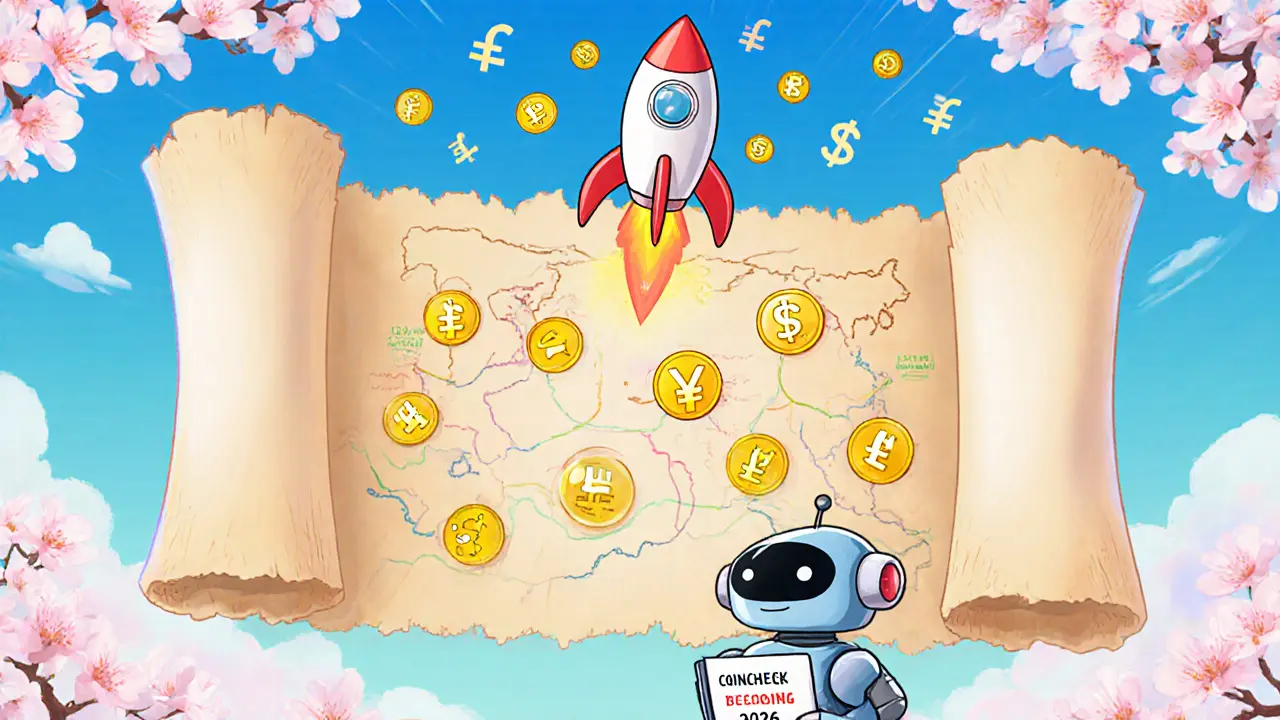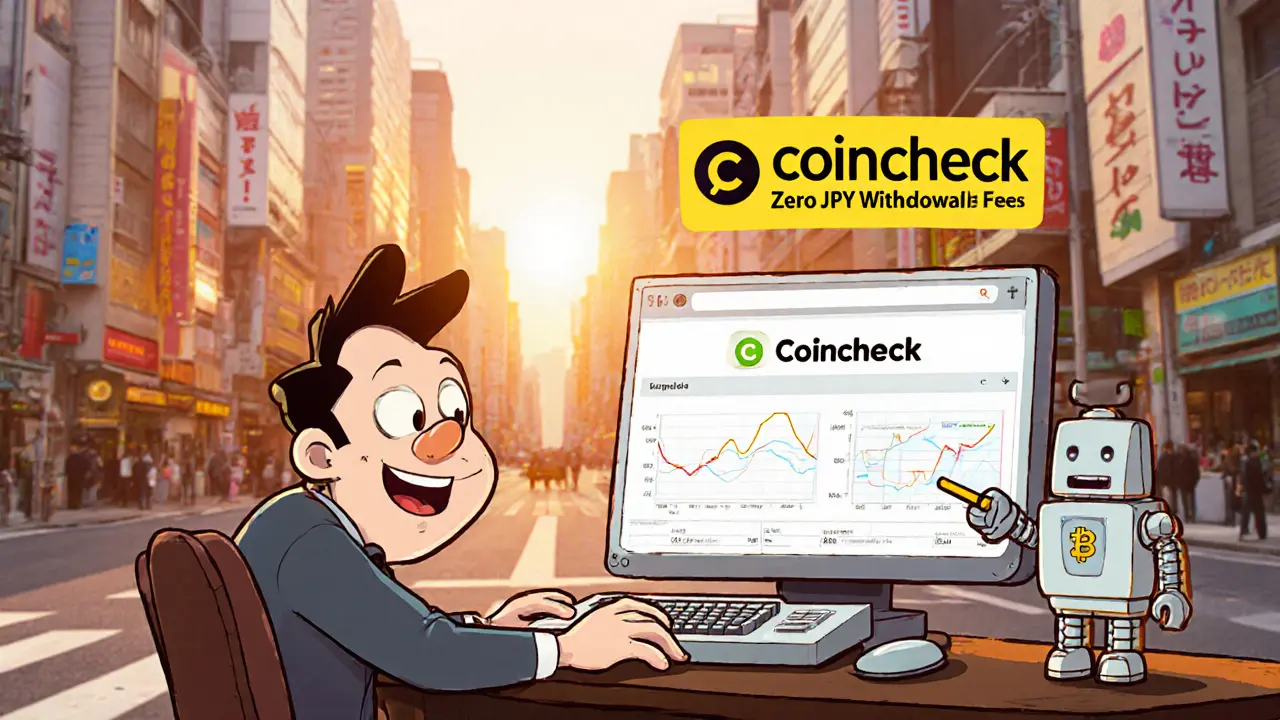Coincheck Fee Calculator
Fee Calculation
Estimate your trading fees on Coincheck based on your asset and trading volume.
Estimated Fees
Coincheck is a licensed Japanese cryptocurrency exchange operated by Monex Group. Founded in 2014, it survived a massive 2018 hack and now trades under the supervision of the Financial Services Agency (FSA). If you’re wondering whether the platform is still a safe place to buy Bitcoin, Ethereum, or any of the 30‑plus altcoins it lists, this review breaks down the most important factors-fees, security, supported assets, and user experience-so you can decide quickly.
Quick Takeaways
- Strong regulatory compliance in Japan; FSA‑approved and listed on NASDAQ.
- Zero JPY withdrawal fees, but crypto‑specific fees vary by coin.
- Spot‑only trading; no futures, margin, or advanced order types.
- Biometric login and multi‑layer security-significant upgrades since the 2018 breach.
- Limited English support and only JPY/USD fiat pairs, making it best for Japanese residents.
Platform Overview
The web interface is clean and intentionally simple. New users are guided through a step‑by‑step onboarding flow that ends with a selfie‑plus‑ID verification check. Mobile apps for iOS and Android mirror the desktop experience and add fingerprint or FaceID login. Deposits can be made via Japanese convenience‑store codes, bank transfers, or USD credit‑card top‑ups. The minimum deposit is 10USDT (or equivalent), while the smallest order you can place is 500JPY.
Security & Compliance
Security is the headline feature that sets Coincheck apart from many overseas peers. After the 2018 theft of roughly $530million in NEM tokens, the exchange overhauled its architecture:
- Two‑factor authentication (SMS or authenticator app) is mandatory for withdrawals.
- SSL client certificates protect API calls and web sessions.
- Automatic log‑out after five minutes of inactivity.
- Cold‑wallet storage for the majority of user funds; hot‑wallet exposure is limited to trading needs.
Because Coincheck is a registered virtual currency exchange under the FSA, it must comply with Japan’s stringent anti‑money‑laundering (AML) rules. Regular audits and a transparent compensation fund for hack victims further reinforce trust.

Fees & Costs
Unlike many global exchanges that charge a flat 0.1% maker/taker fee, Coincheck uses a per‑coin fee schedule that ranges from 0% for Bitcoin withdrawals to up to 0.25% for smaller altcoins. Deposits and withdrawals in JPY are fee‑free, a rare perk for Japanese users.
| Asset | Deposit Fee | Withdrawal Fee | Trading Fee |
|---|---|---|---|
| BTC | Free | Free | 0.15% |
| ETH | Free | 0JPY (network fee applied) | 0.20% |
| Other Altcoins | Free | 0.02%-0.25% (varies) | 0.20%-0.25% |
If you trade large volumes, the fee advantage is modest compared to zero‑fee tiers on platforms like Binance. For casual Japanese investors, the lack of hidden charges is a plus.
Supported Cryptocurrencies & Trading Features
Coincheck lists about 30 coins, including staples like Bitcoin, Ethereum, Ripple, Litecoin, and newer names such as SHIBAINU and ApeCoin. The exchange does not offer futures, options, or leverage trading, limiting it to spot transactions.
Order types are basic: market, limit, and stop‑limit. There are no sophisticated tools like trailing stops or iceberg orders that power traders expect on Kraken or Bitstamp. However, the simplicity keeps the UI uncluttered for beginners.
User Experience & Support
The onboarding flow walks you through email verification, ID upload, and a selfie‑with‑ID check. Once approved, you can start trading within minutes. The mobile apps are responsive, though a handful of users have reported occasional lag when viewing price charts on older Android devices.
Customer support is available via email, phone, and a ticketing system, but live chat is missing. Response times can stretch to 48hours, especially for non‑Japanese inquiries. Trustpilot’s average rating sits at 1.8/5, with the most common complaints targeting language barriers and slow replies.

Pros and Cons
- Pros
- Fully regulated by Japan’s FSA - strong legal protection.
- Zero fees for JPY deposits/withdrawals.
- Biometric login and layered security.
- Simple UI suited for first‑time investors.
- Cons
- Only spot trading; no futures or margin.
- Limited cryptocurrency selection versus global rivals.
- English interface is minimal; most help docs are Japanese.
- Customer support perceived as slow.
How Coincheck Stacks Up Against Competitors
| Exchange | # of Coins | Fiat Pairs | Leverage | Language Support | Regulatory Status |
|---|---|---|---|---|---|
| Coincheck | ≈30 | JPY, USD | None | Japanese (partial English) | FSA‑licensed, NASDAQ‑listed |
| Binance | 350+ | Multiple (USD, EUR, GBP, etc.) | Up to 125× | English + 30+ languages | Unregulated in many jurisdictions |
| bitFlyer | ≈70 | JPY, USD, EUR | None | Japanese, English | FSA‑licensed |
For a Japanese resident who wants a hassle‑free link to local banks, Coincheck remains a solid choice. International traders seeking deep liquidity, a barrage of altcoins, or high‑leverage products will gravitate toward Binance or Kraken.
Future Outlook
Coincheck’s roadmap for 2026 includes adding five new cryptocurrencies and rolling out limited English support for core functions. Staking services for Ethereum have launched, taking a 30% fee on rewards, while crypto‑lending now offers up to 5% APY. The exchange’s growth will likely mirror Japan’s crypto market, projected to expand at a 14% CAGR through 2028. Without a major push toward multilingual support, its global footprint will stay modest.
Frequently Asked Questions
Is Coincheck safe after the 2018 hack?
Yes. Post‑hack, Coincheck implemented cold‑wallet storage for the majority of assets, added mandatory 2FA, SSL certificates, and regular security audits. The FSA oversight adds an extra layer of legal protection.
Can I trade Bitcoin with leverage on Coincheck?
No. Coincheck only offers spot trading. If you need margin or futures, you’ll have to look at platforms like Binance or Bybit.
What fiat currencies can I use on Coincheck?
Japanese Yen (JPY) is fully supported, and USD can be used for deposits via credit‑card. Other fiat pairs are not available.
How fast are withdrawals?
JPY withdrawals to Japanese banks are processed within 1‑2 business days. Crypto withdrawals depend on network congestion but usually complete in under an hour for major coins.
Is there a mobile app for Coincheck?
Yes, Coincheck offers native iOS and Android apps with biometric login, real‑time price alerts, and the same trading features as the web version.

Hey folks! If you’re digging into Coincheck, the fee structure is actually pretty friendly – deposits are free, withdrawals are basically free for BTC, and the trading fee is just 0.15% on volume. It’s a solid entry point for beginners, and the interface makes it easy to track your trades.
Feel free to experiment with the calculator on the page; it’s a great way to see exactly what you’ll pay.
Ah, the age‑old dance of cost versus convenience, a true symphony of market mechanics! 😎🧐 While many tout "free" deposits, remember that the hidden cost is often the spread, whispering sweet nothings into your profit. And that 0.0015‑0.0020 trade fee? It's like a subtle nudge from the universe reminding us that nothing in crypto is truly free.
Consider the existential weight of each transaction – are you truly paying for security, or merely for the illusion of safety? 🍃✨
Listen up, the numbers on the page tell the whole story – deposit free, withdraw free for BTC, and a flat 0.15% trade fee. If you're looking for a platform that actually respects your capital, Coincheck is decent, but don't be fooled by the “free” labels. The real security comes from two‑factor auth and cold storage; if they slip up, you’re dead‑beat.
Use the fee calculator, set a realistic volume, and decide if the marginal profit margin covers inevitable slippage. Anything less is a waste of time.
Honestly, I think the whole hype around Coincheck is overblown. Sure, the fees look tidy, but the exchange’s UI feels dated, and their customer support is basically a ghost town. If you’re serious about trading, you might want to look at platforms with deeper liquidity pools.
Oh, the drama! Let’s dissect the jargon: “free deposit” is a marketing veneer, while “0 JPY network fee” for ETH is a thinly veiled profit sink. The fee table hovering in pastel blues is nothing but UX theater – underneath, you’ve got a labyrinth of micro‑charges.
In sum, it’s a performance art piece that pretends to be straightforward.
Dear Community,
It has come to my attention that certain aspects of the Coincheck fee schedule merit a nuanced examination. While the deposit fee is indeed listed as “Free,” one must consider ancillary costs associated with network congestion. Moreover, the withdrawal policy for BTC, albeit “Free,” is contingent upon adherence to internal security protocols. Consequently, prudence dictates a thorough assessment prior to allocation of assets.
Sincerely,
Coincheck’s fees are low enough for most traders.
The so‑called “free” deposit is just a scam. You’ll end up paying hidden fees everywhere. Their interface is clunky and the support never answers. Avoid it.
I’ve been playing around with the fee calculator and it’s actually quite transparent. The trade fee of 0.15% is reasonable compared to other exchanges, and the free deposit/withdraw for BTC really helps small‑scale traders get started without worrying about extra costs.
Exactly! And if you combine that with the fact that Coincheck offers a mobile app with real‑time alerts, it becomes a solid choice for everyday users. Just remember to enable 2FA and keep your recovery phrase safe.
They’re probably feeding us data from the deep state, watch the fees.
When one contemplates the architecture of a modern cryptocurrency exchange, several layers of abstraction emerge, each bearing its own set of costs and safeguards. At the base, the ledger itself is immutable, a digital ledger that, by design, eschews the whims of centralized actors. Ascending from this foundation, the exchange’s custodial mechanisms must reconcile user convenience with the imperative of security, often manifesting as cold‑storage practices punctuated by multi‑signature protocols. The fee schedule, presented in a seemingly simplistic tabular format, belies the nuanced economics of liquidity provision, market‑making spreads, and order‑book depth.
Deposit fees are labeled “Free,” yet the underlying network fees for Bitcoin can fluctuate wildly during periods of congestion, subtly influencing the true cost to the end‑user. Withdrawal fees, while advertised as “Free” for BTC, may incur hidden costs in the form of internal accounting or minimum thresholds that trigger ancillary charges. Trading fees, set at 0.15% for Bitcoin and marginally higher for other assets, are competitive when benchmarked against industry standards, yet they must be evaluated against the backdrop of slippage, especially for high‑volume orders that can move the market.
The exchange’s user interface, designed with a clean aesthetic, simultaneously serves as a conduit for education, offering a fee calculator that demystifies the algebra of transaction costs. By inputting a hypothetical JPY volume, traders can visualize the incremental impact of each fee component, fostering a more informed decision‑making process. Additionally, the inclusion of two‑factor authentication and optional biometric login enhances the security posture, mitigating the risk of unauthorized access.
From a regulatory perspective, the platform’s compliance mechanisms, such as KYC and AML protocols, further shape the user experience, introducing an additional layer of procedural overhead that may affect onboarding speed. Despite these considerations, the overall value proposition of the exchange remains attractive for newcomers seeking a low‑barrier entry point into crypto trading, provided they remain cognizant of the dynamic nature of network fees and market volatility. In sum, the ecosystem of Coincheck is a microcosm of the broader cryptocurrency landscape: a delicate balance of accessibility, cost efficiency, and security safeguards that demand continuous vigilance from its participants.
Feels like they just copy‑paste the fee table from somewhere else. Not impressed.
Nice breakdown! I’d add that keeping an eye on the fee calculator before making large trades can save you a few bucks. And always double‑check you’ve got 2FA turned on – it’s the simplest way to protect your assets.
From a cultural standpoint, it’s interesting how Japanese exchanges like Coincheck emphasize simplicity in their UI – it mirrors the broader design ethos of minimalism prevalent in the region. This can be a double‑edged sword: while it eases onboarding for novices, it may hide advanced features that power traders need. Nonetheless, the fee structure is transparent enough for most users, and the free BTC withdrawal aligns with the local preference for low‑cost crypto adoption.
Coincheck looks clean but I think the fees are overhyped 🤔 it’s like they want us to believe it’s the best 🤷♀️ maybe not
🇺🇸 Listen, these foreign exchanges think they can out‑play us with “free” fees, but they’re just cutting corners on security. 🤬 We need to protect our American crypto investors from these gimmicks! 💪
Just a heads‑up: the fee calculator is accurate as of now, but always verify the current rates on the official site before executing a big order. The free deposit and withdrawal for BTC are genuine, and the 0.15% trade fee is competitive. Glad to help! 😊
The fee table looks nice but it’s just a distraction.